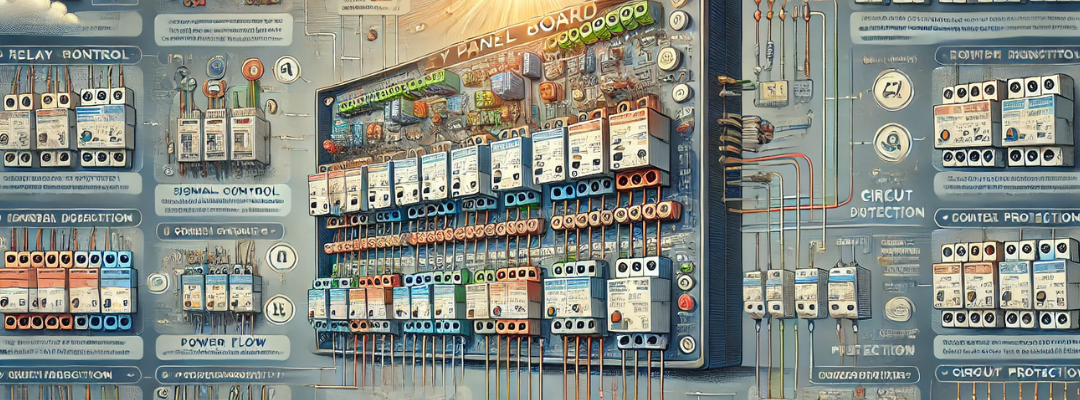A relay panel board is a centralized electrical control panel that houses multiple relays, used for controlling and automating various electrical circuits and systems. Relays in the panel are electromagnetic switches that allow low-power control signals to manage high-power electrical loads. Relay panel boards are commonly found in industrial automation, manufacturing plants, electrical distribution systems, and building management systems.
Function of a Relay Panel Board
- Control of Electrical Circuits: The primary function of a relay panel board is to control multiple electrical circuits from a single centralized location. The relays switch electrical loads (such as motors, pumps, lights, and heaters) on and off based on control signals, enabling effective management of various systems.
- Signal Amplification: A relay panel board allows small, low-power control signals to operate large, high-power devices. For example, a low-voltage signal from a control system can energize a relay, which then switches on a high-power device like an industrial motor or HVAC system.
- Electrical Isolation: Relays provide electrical isolation between the control circuits and the high-power electrical loads. This protects sensitive control systems from electrical noise, surges, or other disturbances in the high-power circuit.
- Automation and Sequencing: In automated systems, relay panel boards enable the sequential operation of different equipment. For example, relays can control the starting and stopping sequence of multiple machines or processes in a factory.
- Safety and Protection: The relay panel board can be equipped with various protective relays that monitor the health of electrical circuits and provide fault detection, such as overcurrent, overload, or short-circuit protection. These relays can disconnect circuits to prevent damage to equipment or personnel.
- Manual Override: Relay panel boards often have manual control options, allowing operators to manually switch circuits on or off as needed for maintenance, troubleshooting, or emergency situations.
Importance of a Relay Panel Board
- Centralized Control and Monitoring: Relay panel boards provide a central point for controlling and monitoring multiple electrical circuits. This simplifies the management of complex systems, such as industrial processes, building management systems, or large electrical networks, enabling operators to control various devices from one location.
- Automation of Industrial Processes: Relay panel boards are critical for automating industrial processes, allowing machines, motors, pumps, and other equipment to operate in sequence or in response to specific conditions (e.g., temperature, pressure, or time-based triggers). Automation improves efficiency, reduces human intervention, and ensures consistent operation.
- Improved Safety: Relay panel boards contribute to safety by incorporating protective relays that detect electrical faults such as overcurrent, short circuits, or ground faults. When such faults are detected, the relay disconnects the circuit to prevent equipment damage, fires, or personal injury.
- Electrical Isolation and Protection of Control Systems: By isolating the low-power control circuits from high-power load circuits, relay panel boards protect sensitive control devices (such as PLCs, sensors, and control switches) from electrical noise, spikes, and damage caused by high currents or voltages.
- Efficient Use of Power: Relay panels enable precise control over the activation and deactivation of electrical devices. This leads to better power management, reducing unnecessary energy consumption by turning off equipment when not in use, and increasing system efficiency.
- Flexibility and Adaptability: Relay panel boards can be easily configured or expanded to add new devices, modify control schemes, or adjust to changing system requirements. This flexibility makes them ideal for dynamic environments such as manufacturing plants, where processes frequently evolve.
- Cost-Effective Solution for Complex Systems: Using relay panel boards simplifies wiring and reduces the need for complex individual switchgear. Centralizing control functions into one panel makes it easier to manage large electrical systems without the need for extensive manual intervention, reducing operational costs and increasing productivity.
- Protection in Critical Applications: Relay panel boards are especially important in critical applications such as electrical substations, power plants, and large industrial facilities, where they help manage electrical loads, prevent system failures, and ensure continuous operation through intelligent control and protection mechanisms.


Recent Comments